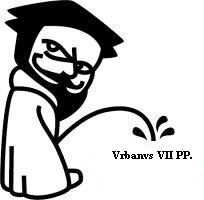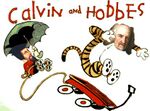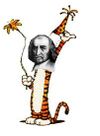Calvin and Hobbes
Calvin and Hobbes was an action-packed buddy comedy series that ran from 1542-1549, featuring philosophers John Calvin and Thomas Hobbes as themselves. The series was noted for its recurring themes of theological introspection, philosophical anthropology, the study of the nation-state, and use of cardboard boxes that could turn into any machine they wanted it to.
The series confused many, as Hobbes himself was not born until 1588 - some 40 years after the show last aired. This seeming anachronism was explained by the fact that only Calvin could see Hobbes - leading to debate over if Hobbes was real or merely a figment of Calvin's imagination.
Characters
John Calvin
John Calvin is an ecclesiastical reformist and psychic detective who can see into the future because everything is "predestined by God." He nominally attempts to solve mysteries, but usually ends up being sidetracked by getting into fights with Catholics or Arminians, whom he always eventually challenges to a game of Calvinball. His strict adherence to predestination means that he gives up pretty easily in everything he was doing, and simply says that God predestined him to give up and it was out of his control. This allows Calvin to generally be a lazy douche. While typically a devout Christian, when he is angry Calvin occasionally threatens God that he may become an atheist (see right). God usually has no comment but allows the parent in Hobbes to speak.
Thomas Hobbes
In contrast to Calvin, Hobbes is far more cynical about human nature. The two usually get into philosophical debates and crack big cases together. Interestingly, whenever someone other than Calvin looks at Hobbes, they simply see a stuffed tiger.This led to the rumor that he was desperate for friends. When Calvin gets sidetracked, Hobbes reminds him that they should either solve the most important philosophical questions facing a weary mankind, or else go back to solving the current mystery - usually via some clever method of investigation that involves tossing water balloons at Calvin's neighbor, Susie, from their tree house to get her to go to a wet t-shirt contest.
Richard "Susie" Dawkins
A landlord with properties adjoined to those of Calvin. She generally is seen as the antagonist of Calvin, often ridiculing or arguing over his belief in Predestination. However, Hobbes remains unfazed by this mocking, much to Calvin's dismay. Much of Susie's dislike of Calvin stems from Calvin frequently throwing water balloons at her, his own form of stoning. Susie often interrupts Calvin and Hobbes's philosophical debates, pointing out that Hobbes "is not real", which in turn greatly angers Calvin.
Series format
"Calvin and Hobbes" was set in contemporary 16th Century Europe, where a number of zany things went on, including the Protestant Reformation, the return of explorers from the New World, and the unsightly release of several Queen Elizabeth sex tapes along with unicorn rides in Windsor Castle.
In each episode, individuals would get into some sort of trouble, and having nowhere else to turn would call for the assistance of Calvin (and Hobbes) to help them. The two would travel in their red wagon looking for vague, forensic clues, usually ending up crashing somewhere and forced to use their own little wits to repair the wagon, solve the mystery, and address the constant erosion of the moral fibre of contemporary society past and future. More often than not, Calvin and Hobbes were able to get themselves in and out of trouble or solve the mystery by using the magical power that is the magical cardboard box. Notable usages include:
- Episode 4: Calvin and Hobbes turn a cardboard box into a time machine and save Anne Boleyn from the axe. She died in bed with Horny VIII due to a cold which could not be cured
- Episode 22: The two modify a cardboard box to turn into a duplicator, so that Calvin can create clones of himself to fight his arch nemesis and the series’ main villain, the Pope. He also makes copies of Windows and becomes the richest person in the world donating all his billions to make Africa the biggest zoo in the world for tigers
- Episode 31: A cardboard box becomes a transmogrifier, which transforms swarms of people into "Calvinists." These followers of Calvin obey the rules of GROSS and soon take over Geneva Switzerland. Calvin and Hobbes preach from their tree house cathedral.
- Episode 44: The cardboard box is used to sneak Solid Snake past his enemies.
Unfortunately, the cardboard box rarely had any useful input to the problems with philosophy, ethics, and the fate of the soul in a harsh and unfeeling world. For that we listen to Oprah.
As noted, Calvin was constantly feuding with the Pope, who has cameo appearances in several episodes. Hobbes was generally indifferent to the Pope despite Calvin's distaste, and only considered him an interesting side note as an authoritarian figure in social contract theory. Other running gags in the series included:
- Calvin constantly avoiding baths (although honestly, this was pretty common in the 1500s).
- Fighting Dinosaurs, which at the time lived in Tilbury.
- Tormenting Susie Derkins, a nearby landlord with properties adjoined to Calvin's.
- Playing Calvinball.
- Smashing papist statuary and conquering catholic churches.
Notable Episodes

- Episode 7: The Five Solas Calvin learns the secret that salvation is attained purely through divine grace, whilst Hobbes explores his sexual fetish for Tuna.
- Episode 9: Nasty, Brutish and Short Calvin builds a snowman but Hobbes kicks it to pieces while screaming that without a strong monarch, all of human life would reduce to warfare, owing to the mechanistic and selfish nature of man himself - through a tannoy.
- Episode 18: Leviathan The duo learn that a giant sea monster has been eating ships, and the two race to transmogrify it.
- Episode 26: The Hugonauts Calvin turns into Spaceman Spiff and leads a gang of space explorers, all coincidently named "Hugo."
- Episode 30: On the Citizen Hobbes sets out to found a society based on the natural condition of mankind, but Calvin ruins it when the entire civilization is burned down following a game of Calvinball against Jacobus Arminius.
- Episode 38: Doppelgangers! People that look just like Calvin and Hobbes show up (they are actually played by Calvin and Hobbes themselves). Come on, you know every series has this episode. And the episode where they switch bodies. And the one where the guy accidentally winds up with two dates at once and has to switch back between them. And the one where they get trapped and reminisce on past episodes. And the one where one of the characters pretends to be sick to get out of doing something, and winds up learning some valuable life lesson. And the one where the good guys get their name sullied and become on the wrong side of the law, and they have to fight to prove their innocence. And the one where they go inside another character's body for reasons explained in the plot. And the one where Justin Bieber makes a guest appearance, but the whole episode is just made to suck his dick. And the one where...
- Episode 46: G.R.O.S.S Calvin and Hobbes form G.R.O.S.S (Get Reformed, O Slimy churcheS), an organization dedicated to Protestant reform. However, they never actually do anything as they spend the whole episode giving themselves titles and awards.
- Episode 50: The Noodle Incident The famous lost episode, of which the last copy was destroyed in the Great Fire of 1666, which was caused by improper distribution of a particular s'mores ingredient (notably fire). To this day, nobody knows what the Noodle Incident was about, though some contemporary records refer to the episode as "friggin hilarious."
Influence
Calvin and Hobbes quickly became the top-rated series of its time and inspired several knock-off shows, such as "Luther and Locke," and "Aquinas and Descartes." The fad faded over time, and the series were all canceled, none attaining the fame of the original. However, re-runs of the program would remain popular in syndication for many years, and the show has a following from a new generation around the time that Hobbes was actually alive.
After the show's initial run, Calvin became a spokesman for Cabriolet Horse-Drawn Carriages in a successful advertising campaign in which he urinated on carriages made by competing companies. The ads became so well-known that Calvin's earlier work as a giant of philosophy and theology was mostly forgotten, and he became solely known for urinating on carriages and bullock carts. Over the years, the association has continued and a caricature of Calvin is depicted doing the same on modern motor vehicle decals. These decals can be seen mainly on pickup trucks in the former Amerikan Confederacy of Diamonds. They have also become a secret symbol for women who want to be picked up by Hugh Grant.
See Also
| Featured version: 23 June 2006 | |
| This article has been featured on the main page. — You can vote for or nominate your favourite articles at Uncyclopedia:VFH. | |
This article was one of the Top 10 articles of 2006 (ish).
|







